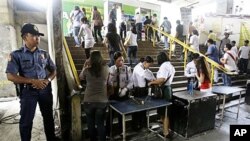Philippine authorities say Tuesday's deadly bomb attack on a passenger bus in Manila has the hallmarks of terrorist attacks in the nation's turbulent south.
Five people were killed and at least 13 others wounded when the bomb ripped apart a bus as it was traveling near Manila's Makati business district. The blast was so powerful it damaged a nearby concrete wall.
Officials say the remotely-detonated improvised bomb used in the attack was similar to those used by Muslim insurgents who have been fighting a decades-long battle for a separate homeland in the southern Philippines, but did not mention any specific group.
No group has claimed responsibility for the Manila attack so far.
Abu Sayyaf, a group linked to al-Qaida, has been linked to terrorist attacks in the region for years. The group has also been blamed for a similar bus bombing in Manila in 2005 on the same road as Tuesday's bombing. Four people were killed in that attack.
This week's incident occurred about three months after the United States and other nations issued travel advisories to their citizens, warning of a potential terrorist attack in the Philippines, including Manila.
President Benigno Aquino acknowledged the government had received intelligence reports last year of potential terrorist attacks in Manila. But he said intelligence officials did not believe the groups had enough resources to carry them out.
Some information for this report was provided by AP, AFP and Reuters.




